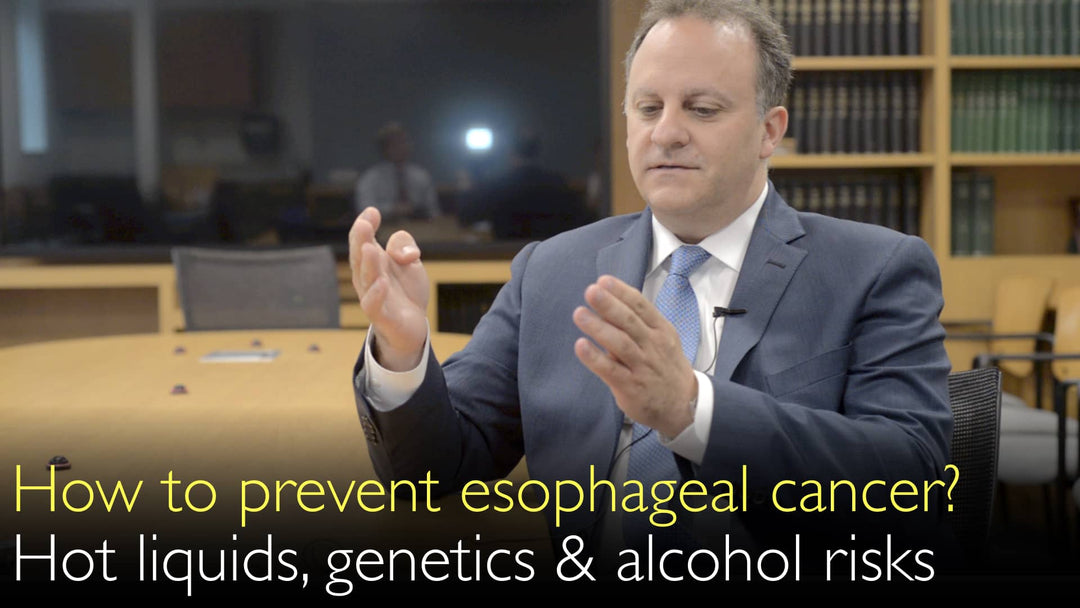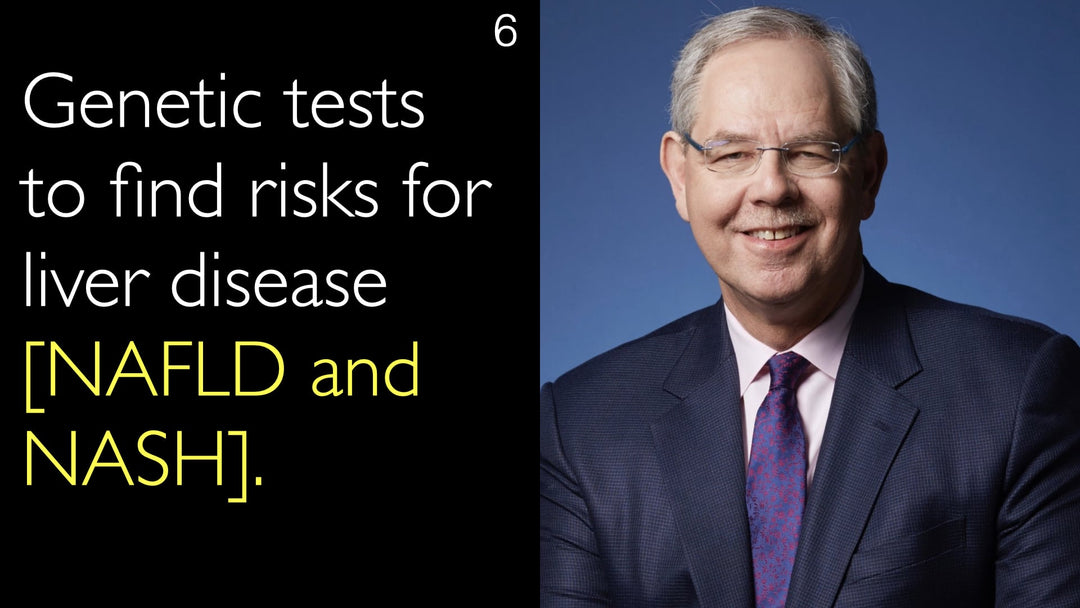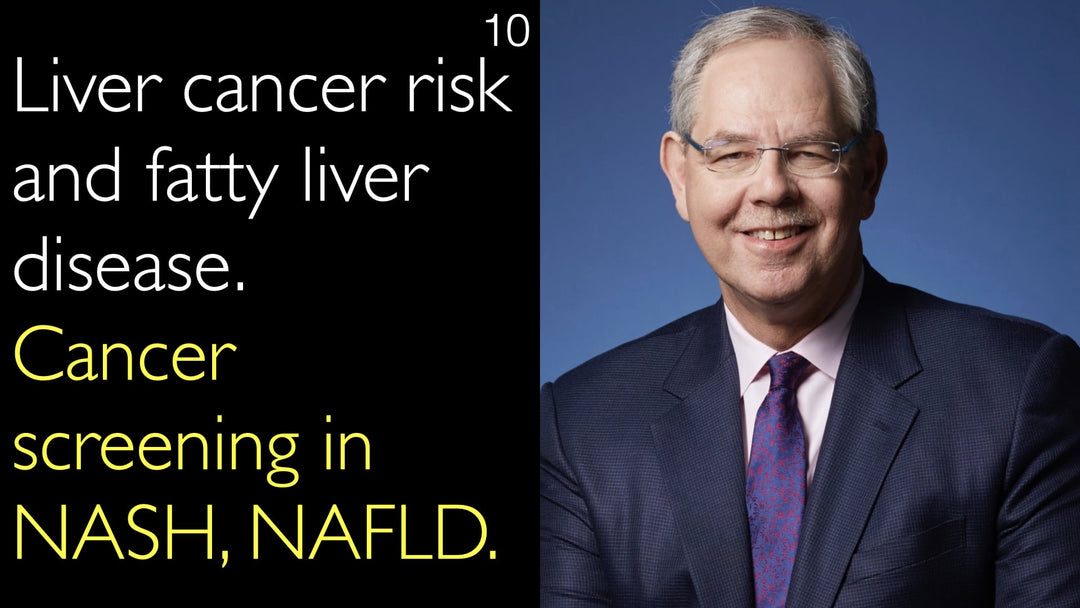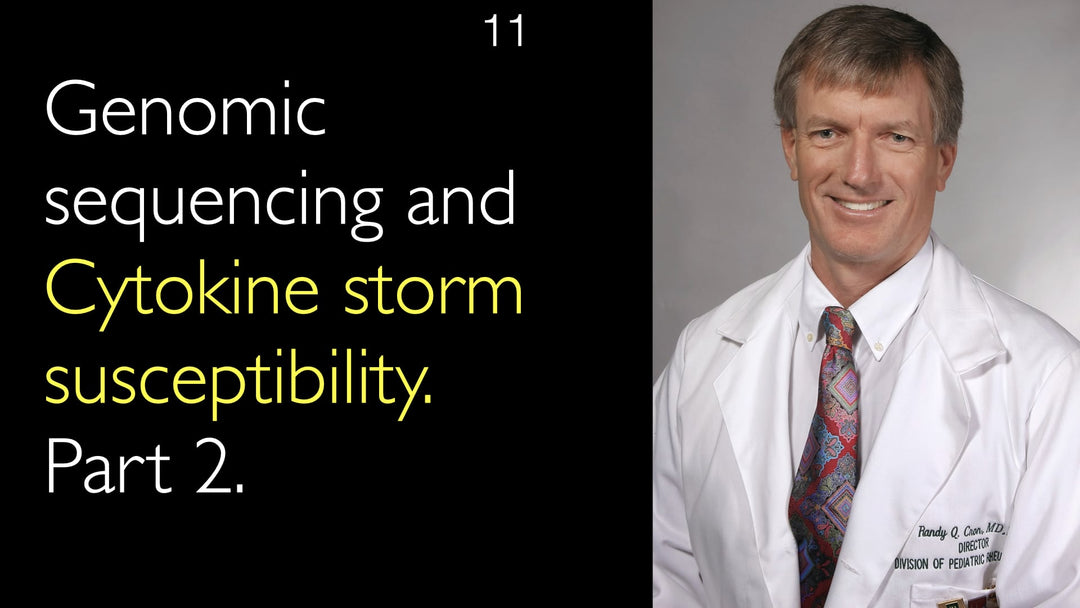Leading expert in thoracic surgery, Dr. Michael Lanuti, MD, explains how to prevent esophageal cancer by addressing key risk factors like chronic acid reflux, which causes lower esophageal cancer in Western populations, and environmental factors like consuming very hot drinks, linked to upper esophageal cancer in Asia. He details the importance of treating GERD symptoms, the role of screening endoscopy in high-risk regions, and clarifies the controversial links between alcohol abuse and specific dietary habits in the development of this aggressive malignancy with an 18% five-year survival rate.
Esophageal Cancer Prevention: Risk Factors, Screening, and Treatment Strategies
Jump To Section
- Global Burden and Survival
- Western Risk Factors: Reflux
- Preventing Reflux-Related Cancer
- Asian Risk Factors: Environment
- Hot Drinks and Cancer Controversy
- Alcohol and Esophageal Cancer Risk
- Genetic Predisposition and Screening
Global Burden and Survival
Esophageal cancer is a highly aggressive disease with a significant global impact, diagnosed in nearly half a million people worldwide. Dr. Michael Lanuti, MD, emphasizes the stark geographical disparities in incidence rates during his discussion with Dr. Anton Titov, MD. While the rate is lower in the United States, it can be thirty times higher in certain regions of China and the Middle East. This variance is critical because esophageal carcinoma is often discovered at a late stage, contributing to its devastatingly low five-year survival rate of only 18%.
The high mortality associated with esophageal cancer underscores the paramount importance of prevention and early detection strategies.
Western Risk Factors: Reflux
In Western populations, the primary driver of esophageal cancer is chronic gastroesophageal acid reflux disease (GERD). Dr. Michael Lanuti, MD, explains that repetitive injury from untreated acid reflux damages the lining of the lower esophagus. Over many years, this cycle of injury and healing can cause cellular changes that eventually transition into a condition called Barrett's esophagus, which is a known precursor to invasive adenocarcinoma of the esophagus.
This mechanism explains why the majority of esophageal cancers in the West occur in the lower portion of the organ, directly adjacent to the stomach.
Preventing Reflux-Related Cancer
Preventing reflux-related esophageal cancer involves a proactive, multi-step approach. Dr. Michael Lanuti, MD, advises that the first step is to seek treatment for persistent reflux symptoms. Pharmacological therapy with acid-reducing medications is a common and effective first-line treatment. For individuals with chronic, long-standing symptoms, Dr. Lanuti recommends a screening endoscopy to visually inspect the esophagus for any signs of damage or pre-cancerous changes.
When medications fail to control symptoms, surgical intervention becomes an option. As Dr. Michael Lanuti, MD, notes, laparoscopic anti-reflux procedures like a Nissen fundoplication can be performed. This surgery involves wrapping the top of the stomach around the lower esophagus to create a new, functional valve, preventing acid from escaping the stomach.
Asian Risk Factors: Environment
The risk profile for esophageal cancer is markedly different in Asian countries, where cancers more frequently occur in the middle and upper esophagus. Dr. Michael Lanuti, MD, clarifies that the exact causes are not fully understood but are believed to be heavily influenced by diet and environmental factors. This has led to the implementation of widespread screening programs in high-risk areas, analogous to screening colonoscopy in the US.
In these regions, screening upper endoscopy is a public health tool to detect early-stage cancers or pre-cancerous lesions in the population.
Hot Drinks and Cancer Controversy
One widely discussed environmental risk factor is the consumption of very hot beverages. Dr. Michael Lanuti, MD, addresses the theory that liquids hot enough to burn the tongue can cause thermal injury to the esophageal lining as they are swallowed. This repeated injury is hypothesized to contribute to the development of squamous cell carcinomas in the upper esophagus. The defining temperature is a clinical one—any drink that feels scalding hot to the mouth is likely to be damaging.
However, Dr. Lanuti points out the controversy surrounding this link. For instance, populations in India also consume large quantities of hot tea but do not exhibit the same dramatically high rates of upper esophageal cancer, suggesting other genetic or dietary co-factors are at play.
Alcohol and Esophageal Cancer Risk
The relationship between alcohol and esophageal cancer is nuanced. In his conversation with Dr. Anton Titov, MD, Dr. Michael Lanuti, MD, states that moderate consumption of any type of alcohol—wine, whiskey, or vodka—is not a significant risk factor. The critical distinction is the pattern of consumption. Alcohol dependency and abuse are strongly linked to a higher incidence of squamous cell cancers, which often occur in the upper esophagus.
The type of alcoholic beverage is less important than the quantity and chronicity of use, with heavy, long-term abuse posing the greatest threat.
Genetic Predisposition and Screening
Beyond lifestyle factors, genetics play a crucial role in determining an individual's susceptibility to esophageal cancer. Dr. Michael Lanuti, MD, indicates that a genetic background likely predisposes certain populations, particularly in Asia, to developing squamous cell carcinomas of the upper and middle esophagus. This genetic predisposition, combined with local environmental triggers, creates a perfect storm of high risk.
This complex interplay between genes and environment is why a one-size-fits-all prevention strategy is impossible and why targeted screening in endemic regions remains a vital component of reducing mortality from this disease. Dr. Lanuti's insights, shared with Dr. Anton Titov, MD, highlight the need for personalized risk assessment.
Full Transcript
Dr. Anton Titov, MD: Can you prevent esophageal cancer? What are the risk factors for esophageal cancer? How do you screen for esophageal carcinoma? Gastroesophageal acid reflux disease increases cancer risk. Genetics and lifestyle increase risks for middle and upper esophagus cancer. What could people do to prevent esophageal cancer?
Dr. Michael Lanuti, MD: Esophageal cancer is diagnosed in almost half a million people globally. In the United States, the esophageal cancer rate is not very high. But the esophageal cancer rate could be 30 times higher in certain areas of China and the Middle East. Because esophageal carcinoma is a very aggressive cancer, there is only an 18% five-year survival rate.
Esophageal cancer is usually discovered at a late stage. So esophageal cancer clearly is a cancer that has high mortality, and prevention of esophageal cancer is important. It depends on where you are in the world.
In the Western world, a lot of the esophageal cancers are from acid reflux. The repetitive injury of having untreated acid reflux can injure the lower esophagus. Over time, that injury pattern can transition into an invasive esophageal cancer.
Dr. Anton Titov, MD: How do you prevent acid reflux?
Dr. Michael Lanuti, MD: You treat reflux symptoms. You get endoscopy if you have chronic reflux symptoms. There is pharmacological therapy for esophageal acid reflux disease. If medicines are not working, then there are surgical operations. We can do surgery to treat acid reflux disease, and some of them are laparoscopic operations.
We call them fundoplications. We wrap the stomach around the lower esophagus to create a new esophageal sphincter.
Sometimes you are in the Asian continent. Then the risk factors for esophageal cancer are very different there. We see more esophageal cancers in the middle or upper esophagus in that part of the world. It's unclear what exactly is causing esophageal cancer in the middle and upper esophagus. We think it's diet and environment.
We think it could be perhaps their diets. Hot tea and something in the diet could increase esophageal cancer risk. Because the risk is so high, there's a screening program for esophageal cancer. It is much like we have screening colonoscopy in the US. They have screening upper endoscopy in the Asian continent.
It is hard for me to answer how you prevent esophageal cancer in the Asian continent. I don't know the answer to that. That's a different type of esophageal cancer, where the intervention to prevent it is not well understood.
Dr. Anton Titov, MD: How do you define "hot" in a hot drink and hot tea? Or any hot liquid that could be a risk factor for esophageal cancer? What tea temperature is considered hot?
Dr. Michael Lanuti, MD: So there is this theory about it. When people drink tea in the temperature range that burns the tongue, that would be clinically hot. What is that in Fahrenheit? I don't know. It is not close to a hundred degrees Celsius, but it is hot enough to burn your tongue.
We think that hot liquid probably can injure the esophagus as the liquid goes down. Maybe that's why we see more upper esophageal cancers in that population. But it is controversial.
You can look at people in India who also drink a lot of hot tea, but we are not seeing the same amount of upper esophageal cancers in those patients. So it's a weak argument. Ultimately, the answer is we are not entirely clear why esophageal cancer happens.
We think it's their diet and perhaps genetics. There is a genetic background that predisposes some patients to upper esophageal cancers. Upper and middle level esophageal cancer happens more often than in the US. We see in the Western world more lower esophageal cancers.
Dr. Anton Titov, MD: Do you think irritation by alcoholic drinks is a risk factor for esophageal cancer? For example, is there a difference between drinking or sipping wine, or sipping whiskey, or having a shot of vodka? A shot of vodka supposedly goes through the esophagus faster but nevertheless is irritating to the esophagus.
Dr. Michael Lanuti, MD: It's an interesting question. I think that any of those that you mentioned, in moderation, should not increase your risk of getting esophageal cancer. On the other hand, we clearly know this: if you have alcohol dependency and alcohol abuse, those patients tend to get more squamous cell cancers that are in the upper esophagus. It does not matter what alcohol you drink.
Dr. Anton Titov, MD: That's understood.







